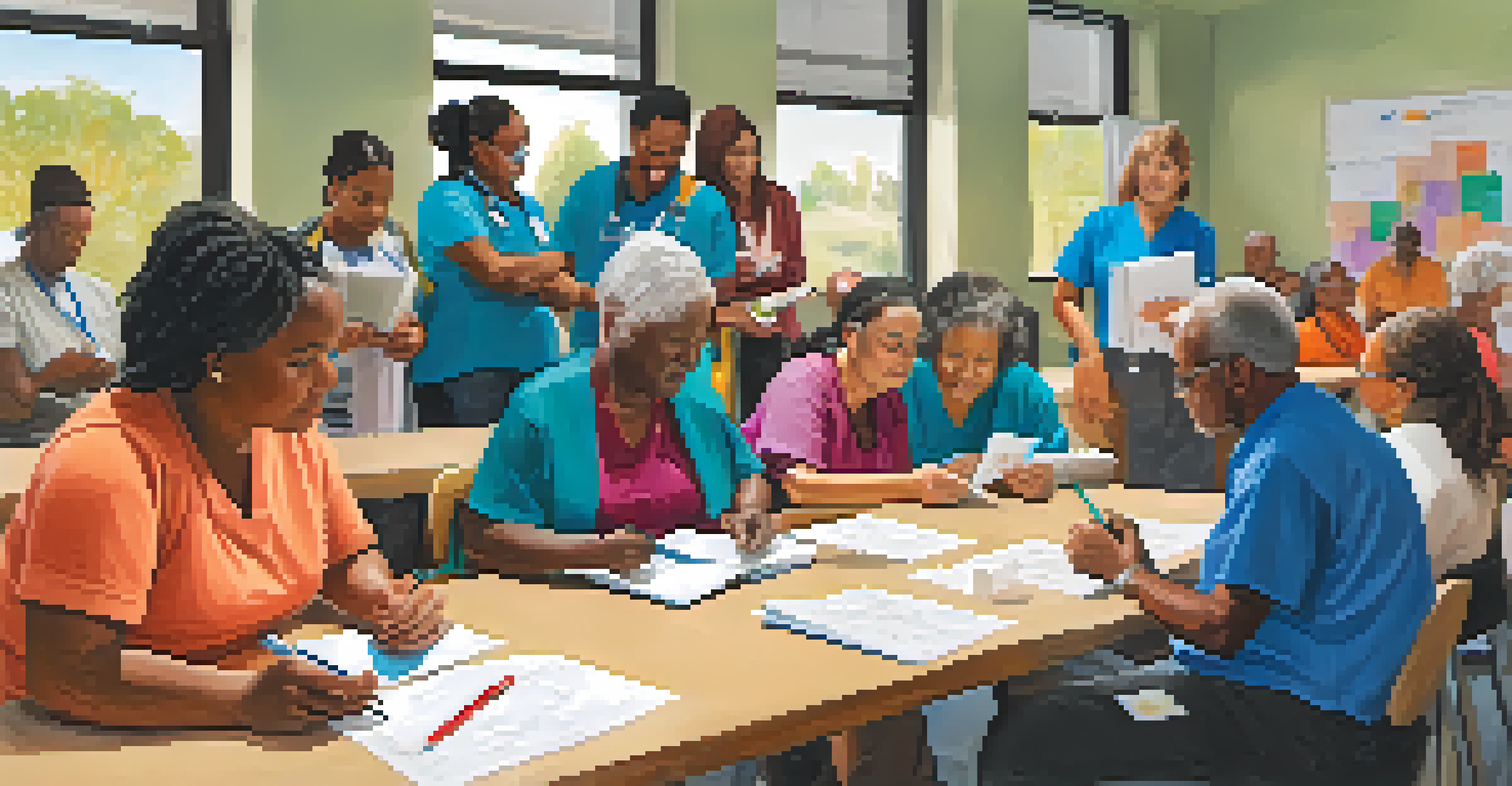The Role of Patient Education in Engagement and Satisfaction

What is Patient Education and Why It Matters
Patient education refers to the process of providing information to patients about their health conditions and treatments. This knowledge empowers patients to make informed decisions about their care. By understanding their health better, patients are more likely to engage actively in their treatment plans.
The greatest weapon against stress is our ability to choose one thought over another.
When patients are educated about their conditions, they tend to feel more in control and less anxious. This increased confidence can lead to better adherence to treatment protocols and a reduction in misunderstanding or confusion regarding their health. Additionally, when patients know what to expect, they can communicate more effectively with their healthcare providers.
Ultimately, patient education is about building a partnership between patients and providers. This partnership fosters a supportive environment where questions are welcomed, and information flows freely. This collaborative approach can significantly improve patient satisfaction and outcomes.
The Connection Between Education and Patient Engagement
Engagement in healthcare refers to how involved patients are in their own care. Education plays a crucial role in this engagement by providing patients with the tools they need to participate actively. When patients understand their treatment options and the rationale behind them, they are more likely to engage in discussions with their healthcare team.

For example, a patient who is educated about their medication regimen is more likely to ask questions about side effects or potential interactions with other drugs. This proactive behavior not only aids in their understanding but also helps healthcare providers tailor treatments to individual needs, enhancing the overall care experience.
Empower Patients Through Education
Patient education enhances understanding, leading to informed decision-making and active participation in healthcare.
Moreover, educated patients tend to take greater responsibility for their health, which can lead to improved outcomes. By fostering engagement through education, healthcare providers can create a more collaborative and satisfying care journey.
Boosting Patient Satisfaction Through Knowledge
Patient satisfaction is often linked to the level of understanding patients have regarding their health and treatment. When patients feel informed, they report higher satisfaction levels. This is because knowledge reduces uncertainty and anxiety, allowing patients to feel more secure in their care.
An informed patient is a better patient.
For instance, a patient who understands the benefits and risks of a surgical procedure is likely to feel more satisfied with the outcome, regardless of whether it meets their expectations. This satisfaction stems from feeling involved in the decision-making process and being prepared for what lies ahead.
Thus, effective patient education not only enhances satisfaction but also fosters trust between patients and their healthcare providers. When patients feel they are partners in their care, they are more likely to express their needs and concerns openly.
The Role of Technology in Patient Education
In today's digital age, technology plays a vital role in facilitating patient education. Online resources, apps, and telehealth platforms have made it easier for patients to access information about their health. This accessibility allows patients to learn at their own pace and revisit materials whenever necessary.
For example, a patient can watch instructional videos about post-operative care or read articles about managing chronic conditions from the comfort of their home. This self-directed learning empowers patients to take charge of their health, leading to greater engagement and satisfaction.
Boost Satisfaction with Knowledge
When patients feel informed about their health and treatment, their satisfaction levels significantly increase.
Additionally, technology can enhance communication between patients and providers. Secure messaging systems allow patients to ask questions and receive timely responses, further reinforcing the educational process and improving the overall experience.
Barriers to Effective Patient Education
Despite its importance, there are several barriers to effective patient education. Factors such as health literacy, language differences, and limited access to resources can hinder a patient's ability to understand their health information. It's crucial for healthcare providers to recognize these challenges and find ways to overcome them.
For instance, providers can assess patients' health literacy levels and tailor their communication accordingly. Using simple language and visual aids can also help bridge the gap for patients who may struggle with complex medical terminology.
Moreover, creating an inclusive environment that addresses diverse needs can enhance the effectiveness of patient education. By acknowledging and addressing these barriers, healthcare providers can facilitate better engagement and ultimately improve patient satisfaction.
Strategies for Effective Patient Education
Implementing effective patient education strategies can significantly enhance engagement and satisfaction. One approach is to use teach-back methods, where patients are asked to explain back what they have learned. This technique ensures that they understand the information and provides an opportunity to clarify any misunderstandings.
Another strategy is to personalize education. When healthcare providers tailor information to individual patients' needs and preferences, it resonates more deeply. This could involve discussing treatment options that align with a patient's lifestyle or cultural beliefs, making the information more relevant and engaging.
Technology Enhances Learning Access
Digital tools and resources empower patients to learn at their own pace, improving engagement and communication with providers.
Creating a supportive environment that encourages questions and discussions can also foster effective education. When patients feel comfortable asking about their care, it enhances their understanding and satisfaction, ultimately leading to better health outcomes.
The Future of Patient Education in Healthcare
As healthcare continues to evolve, so does the approach to patient education. The future will likely see a greater emphasis on personalized education, leveraging data analytics to tailor information to individual patients. This shift will help ensure that patients receive the most relevant and effective educational resources.
Additionally, advancements in technology will continue to play a significant role. Virtual reality, artificial intelligence, and interactive platforms could revolutionize how patients learn about their health, making education more engaging and impactful.

Ultimately, the goal is to create a healthcare environment where patient education is prioritized, leading to enhanced engagement and satisfaction. By embracing innovative approaches and addressing barriers, we can empower patients to take an active role in their health journeys.